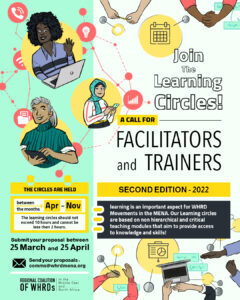A call for facilitators and trainers
In 2020, the WHRDMENA Coalition conducted a strategic Assessment, which provided the  WHRDMENA Coalition with information about its member’s needs in terms of skills and tools to use in political and social organizing. The assessment gave us some ideas about what would and could be the learning themes that we need to host.
WHRDMENA Coalition with information about its member’s needs in terms of skills and tools to use in political and social organizing. The assessment gave us some ideas about what would and could be the learning themes that we need to host.
However, our current world, which suffers from the Covid-19 pandemic, represents an obstacle to organizing educational residencies. We cannot rely on travel and meetings that depend on face-to-face attendance. We are fully aware of the difficulty of creating long-term non-academic online learning courses after one year of a pandemic and the increasing presence the “virtual meeting fatigue,” in addition to the psychological and physical effects caused by all covid-19 procedures, such as confinement, isolation, and the loss of relatives and loved ones. Therefore, the WHRDMENA Coalition explores new learning spaces capable of providing WHRDs with information, knowledge, and tools. We hope the LCs will open new horizons for WHRDs by providing technical skills that enhance the quality of their Human Rights activism.
Therefore, the WHRDMENA Coalition relies on the idea of learning circles that are non-authoritarian, participatory, and provide accessible learning to create new spaces capable of providing skills. For example, the LCs can provide know-how on using a digital app that would help reduce the burden of administrative work. Or it offers the application to assist in transparent co-management of activities or how to design posters for advocacy activities. The LCs can introduce topics that increase awareness of wellbeing or how to share ways to develop skills in documentation, writing reports, or creating digital content.
The Learning circles can share the ways and tools of community organizing through learning conflict resolution and nonviolent communication skills, standards for creating a healthy and supportive work environment, and performing psychological first aid, or, for example, how to organize local, international, or United Nations entities advocacy campaigns.
In 2021, the WHRDMENA Coalition explored the Learning Circles spatially and practically due to organizing around 7 of them in the following areas: How do we write to Special Rapporteurs and why? How do we understand advocacy from a technical point of view? How are the messages of our campaigns and advocacy gendered? We explored nonviolent communication skills and compiled knowledge on the menstrual cycle. Individuals and human rights organizations established some LCs. We will incorporate last year’s learning and recommendations from our participants into this year’s Learning Circle.
However, we do encourage circles on the following themes this year: good essential governance, conflict resolutions skills, conflict management skills, safe environments, and local feminist history.
To establish learning circles in the WHRDMENA Coalition, we call for facilitators and trainers to submit a proposal on the learning circle and its goals.
The WHRDMENA Coalition aims to hold 15 learning circles between April till November 2022! Learning Circles should not exceed 10 hours and can’t be less than two hours.
Suggested criteria:
1) Introduction to the trainer/facilitator and an overview of the experience in their field.
2) The title of the learning circle.
3) 500 words about the purpose of the circle and what impact the topic will have on WHRDs or what skill they will obtain.
4) 500 words about the training technique, timeline, number of hours, and how many days the circle will run (e.g., a learning circle on how to use Slack to manage a team, a 4-hour learning circle, a maximum of 6 people, the first hour: explanation of the application, a glimpse, a visual about it, how to download it. The second hour: live experience, description of channels, how to use the bot, etc.).
5) criteria for participation (Do participants, for example, have to be familiar with a specific topic or not, etc., read a particular article or file, etc.?).
6) Is there specific timing for the circle? For example (August, second week, after 5:00 Beirut time).
Criteria based on the recommendations of the participants:
- To send readings or an overview of skills before the LC
- Determine what knowledge/skill will be gained
- Trainers should be aware of all our region’s different dialects and pronunciations.
- the circles that run between 5 to 10 hours need to make time for ice-breaking activities
- some visual or audio materials sharing during the sessions is encouraged for the circles that run between 5 to 10
- Evaluation is encouraged to be done during LC or shortly after.
Please send us your proposal: comms@whrdmena.org. We also hope those interested send a complete proposal in both form and content. In the Subject of your email, please use this format: LC + title+ month.
Application received between 25 March to 25 April.
- We will contact selected trainers will be contacted by 1st May and 1 June.
- The Coalition will award facilitators and trainers a nominal remuneration.
- The training can be in Arabic or English (the WHRDMENA Coalition provides translation).

